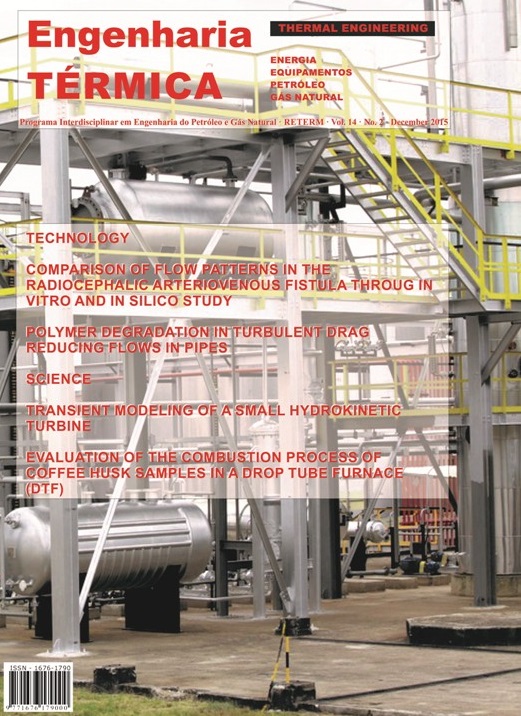RHEOLOGICAL ANALYSIS OF VEGETABLE OILS USED FOR BIODIESEL PRODUCTION IN BRAZIL
DOI:
https://doi.org/10.5380/reterm.v14i2.62129Palavras-chave:
temperature, rheological modeling, vegetable oilsResumo
Rheology attempts to define a relationship between the stress acting on a given material and the resulting deformation and/or flow that takes place. Thus, the knowledge of rheological properties of fluid materials such as vegetable oils generates auxiliary data that can be used in its storage and application. In this context, the aim of this study was to evaluate the rheological behavior of vegetable oils (cotton, canola, sunflower, corn and soybean) at different temperatures, using four rheological models (Ostwald- de-Waelle, Herschel-Bulkley, Newton and Bingham). The rheological properties were determined using a Thermo Haake rheometer with concentric cylinder geometry. Measurements were taken at 30, 45 and 60 °C by controlling the temperature using a thermostatic bath coupled to the equipment. The software Rheowin Pro Job Manager was used for process control and data record. The rheograms were obtained by measuring the values of shear stress varying the shear rate from 100 to 600 s-1 within 250 seconds. For the analysis of the apparent viscosity at different shear rates was applied simple linear regression until 2nd degree with the aid of SAS (SAS/Stat 9.2) program. The apparent viscosity data were submitted to analysis of variance and the averages were compared by Tukey test at 5% of probability. Higher temperatures of the samples were correlated to lower shear stress values, hence lower values for viscosity and consistency index were obtained, since it is known that the density and viscosity are highly sensitive to temperature and that the increase in temperature results in reduction of viscosity, benefiting the fluid flow. The models of Newton and Ostwald-de-Waelle were chosen to evaluate the rheological behavior of the samples, showing a good fit for the rheological data.
Downloads
Publicado
Como Citar
Edição
Seção
Licença
Direitos Autorais para artigos publicados nesta revista são do autor, com direitos de primeira publicação para a revista. Em virtude da aparecerem nesta revista de acesso público, os artigos são de uso gratuito, com atribuições próprias, em aplicações educacionais e não-comerciais.



